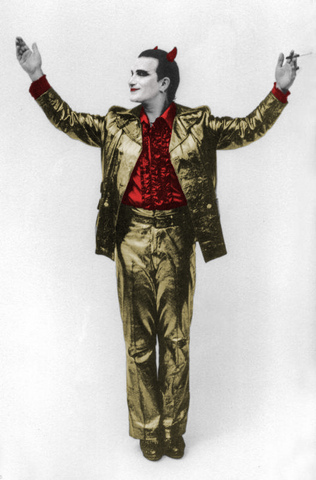I think I’ve mentioned before that I have serious problems with being indecisive, especially when U2 has so many ridiculously great songs in their catalogue that just beg to be given attention. It’s a real struggle to choose just one song for a post. But this time, I had a sudden epiphany, an epiphany that came to me as I was contemplating the wonders of facepaint and Spandex: I haven’t done a MacPhisto song yet!
<cue audience gasping!>
I know, I know. How could I have gone for so long without mentioning such an auspicious character, such a venerated part of the U2 mythos? I’ve been neglecting my duties is a ZooTV fan in a most horrendous way.
Well, today I’m going to rectify that problem. I’m going to cover Desire!
Okay, sure. That might be cheating a little bit, since that song really originated during the Rattle and Hum era. And let’s face it, Mirrorball Man’s version of this song can give Mackey a run for his money. But nobody sings this song quite like Mr. MacPhisto, and after all, it was one of the charming devil’s staples in the Zooropa tour.
“Zooropa, my Zoorrrrrroppppaaaaa!”
Okay, sorry, I had to get that out. Now I’m done and we can move on.
The Rattle and Hum version of the song is very fast-paced, very American. The lyrics and the music both seem to exude an aura of “classic rock,” much like the other songs on the album. The images of the first verse—setting out with nothing but a red guitar and a heap of bravado—definitely reflect the youthful notion of heading out to Memphis or Nashville or Hollywood or wherever. Anywhere, really, as long as it’s on the road to fame and stardom.
In Bono in Conversation, Michka Assayas quotes Bono as having said: “See, there’s a chasm between envy and desire… Envy is like wanting something that’s not yours. But desire is different. Desire comes out of wanting what is yours, and still wanting it even if it’s not there yet, but it’s not envy. When desire becomes envy, there’s a difference.”
Bono’s interpretation of “desire” shows that the song is about possibilities, reaching out to grasp opportunities. Even if the thing you’re trying to attain isn’t quite within reach yet, it’s still yours; it’s your birthright, something God-given, or something you’ve earned. “Desire” in the way Bono sees it is a kind of earnestness, a pure and optimistic sense of purpose.
But Mr. MacPhisto and his silvery televangelist counterpart interpret the word a little differently.
For MacPhisto and Mirrorball Man, “desire” isn’t about reaching out for what’s rightfully yours, for appreciating and claiming what God already gave you. For them, the lines between desire and envy are blurred, and “desire” is more about possessions, materialism, money, wealth, fame, power, lust…
MacPhisto doesn’t care about performing in itself. He doesn’t want to be a performer because it’s something he loves doing or because that’s his talent or because he wants to change the world. He isn’t grateful to be there. He just wants the attention, the power, and the wealth that come from being ultra-famous. He wants to get whatever he wants, no matter what it is, regardless of whether it’s something he deserves and regardless of whether he should have it or not. That mindset isn’t desire. It’s envy. It’s desire corrupted.

To be honest, I think that this interpretation is much more true of Mirrorball Man, but it still applies to MacPhisto before his character arc in the last part of the Zooropa tour (but I’m going to save that discussion for a later post).
The second verse sets up some interesting images: a burning candle, a needle and a spoon, a counter and a shotgun… And that last one is particularly interesting to me. Unlike the other images from this verse, which clearly refer to a woman, this last image sounds almost like a holdup in an old-fashioned general store. In fact, I think that that’s exactly what it is. Just a few years after Rattle and Hum was released, Bono wrote this great line: “Every artist is a cannibal, every poet is a thief.” That famous quote from “The Fly” echoes the sentiment from “Desire:” that we all take from everyone else.
In U2: Into the Heart, Niall Stokes mentions that parts of the song were inspired by Iggy Pop, Bo Diddley, and Buddy Holly, as well as the genre of R&B in general. “Desire,” just like The Joshua Tree and the rest of Rattle and Hum, was inspired by other musicians. Taking bits and pieces from other people, U2 created their own songs and made something new and different…but you could still apply the sentiment that once an idea has been put out into the world, “pretty soon, y’all, everybody’s got one.”
Something else interesting is the way Bono throws that “y’all” into the lyrics in most performances. That particular bit of Southern-ness fits with the crazy televangelist character, but it’s much more striking when Mr. MacPhisto says it in that suave British accent. It’s like he’s throwing attention back onto the American roots of the song, giving them credit, maybe…in his own weird, slightly creepy, and derisive fashion. MacPhisto, as we all know, is a very complicated man, and you needn’t look any further than the gold suit to realize that he’s in no small part based on Elvis. Elvis, Johnny Cash, and so many other great musicians were nearly destroyed by the fame they so cherished… Indirectly, by calling out the Southern traditions that inspired the song, MacPhisto is referencing his own bizarre origins.

And speaking of Mr. MacPhisto, one of the most inadvertently hilarious things about this song is the repeated images of burning. Fevers, fire, candles… Desire is like a fire, but when you throw the Devil into the mix, suddenly stuff gets a lot more interesting, because then, you can’t help but think of how that earthly fire corresponds to the afterlife.
Especially since the very last part of the song discusses the root of all evils: money! “She’s the dollars, she’s my protection. Yeah, she’s the promise in the year of election…” Money and promises that no one intends to keep are two big examples of worldly things that offer a false sense of security. Matthew 6:25 says, “Isn’t life more than food, and the body more than clothing?” The physical trappings of life that MacPhisto embodies—flashy clothes, fancy food, sparkly telephones—matter absolutely nothing, because life is more than that. Yet even so, we cling to worldly things for comfort, never stopping to think that maybe these things are just like a politician’s campaign promises: they sound good, but they’ll never have any substance.
That’s one of the interesting things about MacPhisto: we hear him talk about his fame and we see him throw money from the stage during this part of the song, but as Bono has mentioned before, all of his fame is a shadow of what he once was, and all of his talk is just lies. In U2 By U2, Bono remarks, “We wanted a more Eurocentric character, more decadent, more old world, rather than the brash Yankee salesman with God on his side. I started to think about what The Fly would be like when he’s old and fat and playing Las Vegas.” (Thanks to the comprehensive MacPhisto library, Canadanne.co.uk, for help in finding that quote.)
As much as Mackey would hate being called old and fat, Bono is pretty much spot-on with that description. MacPhisto, once an angel and now fallen, once a superstar and now a has-been, is clinging to his wealth and the remnants of his former fast-paced life, but the truth is that all of that is gone.
And there’s the point of it all: that the Devil’s idea of success isn’t really success at all. What MacPhisto and Mirrorball Man want you to think is that success is about fame, fortune, power, dollars. They’re the preachers at the traveling shows; they’re the false prophets trying to get you to sell your soul. Money and materialism are not success, and all the shiny suits in the world can’t change that.
My all-time favorite Scripture verse is Matthew 6:19-21: “Don’t lay up treasures for yourselves on the earth, where moth and rust consume, and where thieves break through and steal; but lay up for yourselves treasures in heaven, where neither moth nor rust consume, and where thieves don’t break through and steal; for where your treasure is, there your heart will be also.”
There’s a passage in The Screwtape Letters where C.S. Lewis’ eponymous demon remarks that the best time for a tempter to capitalize on twisting the earthly pleasures is during a period when a human takes the least enjoyment from life. If it’s not fulfilling spiritually, then it isn’t success. Despite the platform shoes and gilded Trabants, MacPhisto is not successful. He wanders from concert to concert, making his phone calls, and he throws his money around, but at the end of every show, he cries for the audience, because only the love from the crowd can fulfill him.
“For love or money?”
Worldly things will come and go, but love?
Real love lasts forever. That’s what success is. That’s what life is.
Not envy, but desire.
Not money, but love.
Lieutenant
Latest posts by Lieutenant (see all)
- We will run like a river to the sea - August 24, 2017
- Do You Feel Loved. Today? - June 18, 2017
- People like Bono, people like Finn Bálor - September 24, 2016



